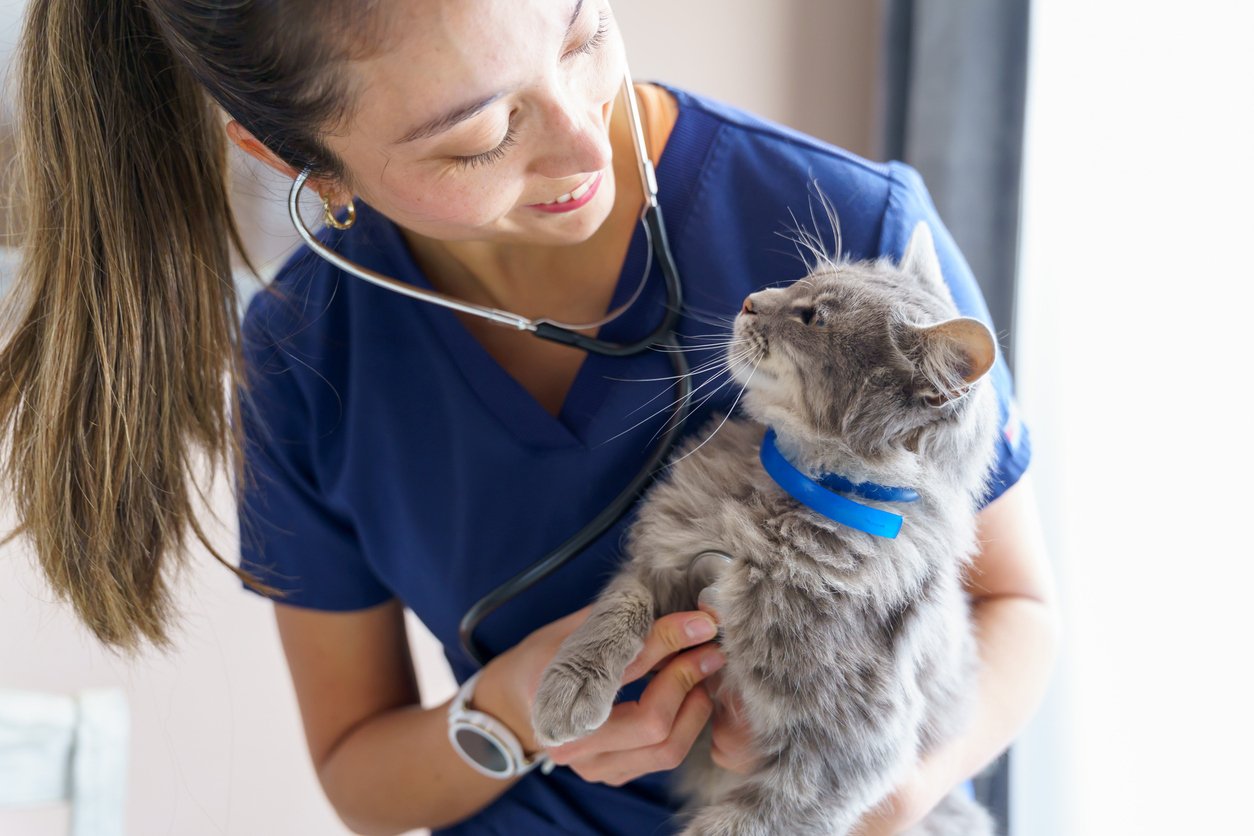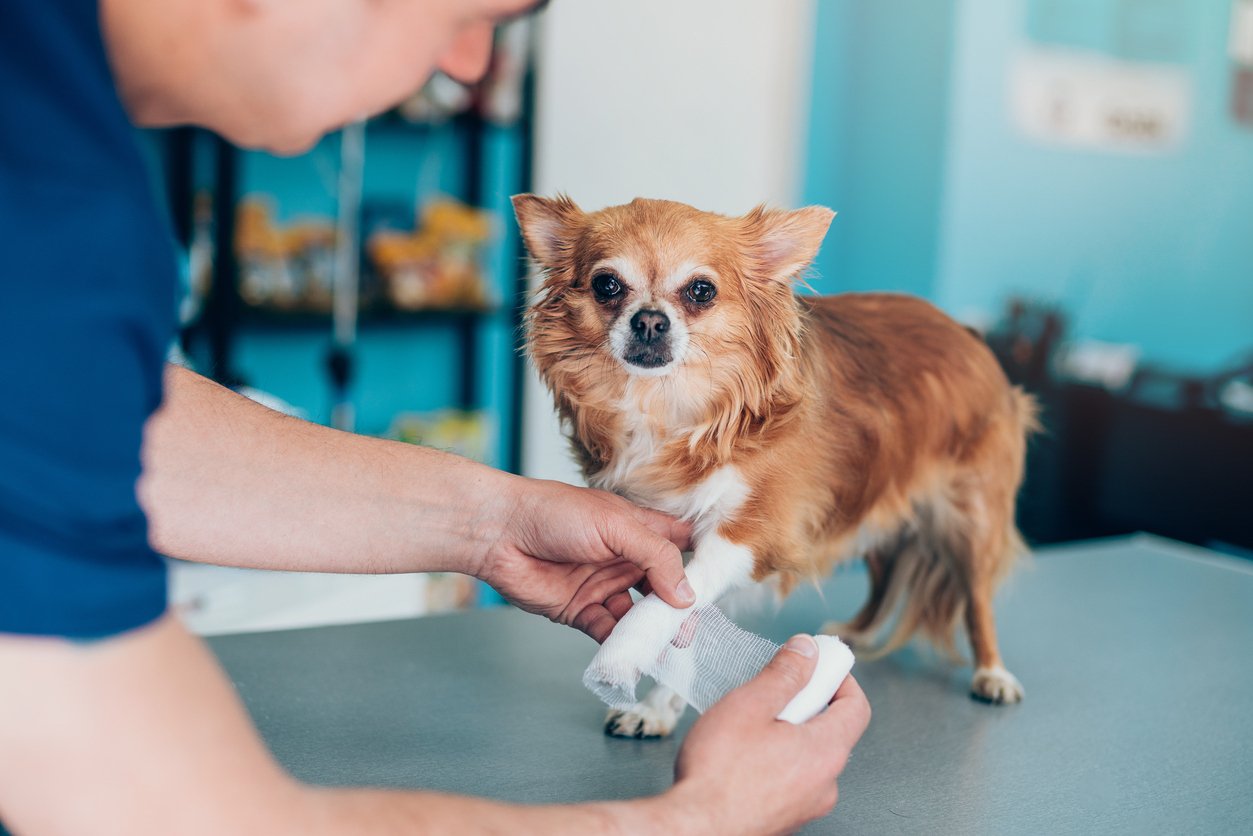Table of Contents
Horses can suffer from health challenges like coat and hoof problems, gut and digestive issues, joint-related problems, and more. Equine health supplements can help alleviate pain and discomfort and prevent the occurrence and progression of some of these health problems.
Though there are many equine health supplements, it is important to understand your horses’ unique dietary needs to pick the right supplement.
This guide will discuss common horse health issues, how equine supplements can help them, and what to look for in a good horse health supplement.
Let's get into it.
Why Are Equine Health Supplements Important?
According to the original definition given by Steven Defilice–the founder and chairman of the foundation for innovative medicine–a supplement is “any food or food product used to provide health benefits including preventative and/or treatment of disease.”
Horse supplements—also referred to as nutraceuticals— are often added to a horse’s daily regimen for several reasons:
- To supplement a missing nutrient in the diet or bridge a nutritional gap
- To provide more significant quantities of something that a horse needs, e.g., glucosamine for joint health
- To address a health condition, such as arthritis
In an ideal situation, your horse should get all their nutritional needs from their feed. Unfortunately, that is not always achievable for several reasons, which we will look at shortly.
Unlike modern-day equines, horses in the past would graze in huge open fields. These pastures had different kinds of grasses, soil, herbs, and shrubs that horses would graze on all day, meeting complete dietary needs for their bodies.
Horses kept in barns or grazing over limited pastures may need supplements to bridge the nutritional gap. Your horse can also benefit from supplements if they are:
- Recovering from an illness or surgery
- Sickly
- On a restricted diet
- In gestation or nursing
- Performing or in strenuous activities
- A senior or retired horse
According to research on equine supplements for hindgut health, most modern-day horse feeds contain more starch-based concentrates than in the past. Starch-based concentrates were introduced in horse feeds as a source of high energy for horses under heavy workloads and strenuous activities.
Recent findings show that though starch concentrates make feed palatable for horses, they raise insulin levels and increase valeric acid production. The effect disrupts the gut's normal functioning, causing gastrointestinal disorders like colic.
Secondly, some feeds may lack critical trace minerals. This can be due to deficiencies in the soil formulation of the region where the forage is growing—like is typical of coastal regions. Therefore, there is a need to supplement these minerals in the horse's diet if the horse lives in that region.
Thirdly, climate changes—especially extremes of heat and cold—demand more specific nutrients from a horse’s feed. Learning how to care for and feed your horse in the winter is important. This is because several things happen in winter:
- Forage reduces and dries up in the colder seasons. Some vitamins, like vitamin A, are lost as forage dries up
- Your horses’ demand for calories also increases
- Exposure to direct sunlight for vitamin D synthesis is limited
If you are not sure whether your horse feed is meeting the required standards, there are several steps you can take:
- Conduct a hay analysis to check for the nutritional content of your horses’ hay
- Ensure that the feed you have is the right type for the horse breed you have. For example, quarter horse breeds need feed low in potassium to prevent HYPP
- Check with your veterinarian. Often, they are a great source of information about the type of food or supplements that would best fit your equine
- Consult with a nutritionist. Where necessary, they will help you pick an appropriate supplement
Horse feed is considered balanced when it consists of the following essential things:
- Minerals and vitamins
- Carbohydrates and fat
- Proteins
- Water
But before purchasing supplements for your horse to ensure they get all of the above in their diet, it’s important to check in with your veterinarian. The table below outlines the various types of horse supplements.
|
Supplement Type |
Importance |
|
Joint supplements |
|
|
Digestive/gut supportive supplements |
|
|
Skin, coat, and hoof supplements |
|
|
Performance supplements |
|
|
Behavior management |
|
Other supplements given to horses are vitamins, minerals, and amino acids. Amino acids are essential because they help in protein synthesis and mineral utilization. Mineral utilization is vital as it impacts bone and soft tissue health.
Aside from feed and supplements, water is one of the most vital parts of a horse's diet. It is critical in maintaining blood pressure, acts as a coolant, supports multiple chemical reactions, and aids digestion to avoid colic. So encourage your horse to drink more water by ensuring the water is clean, accessible, and between 7-24 degrees celsius to encourage consumption.
How Can Supplements Help Improve Horse Health Care?
To provide the right supplements for your horse, it is essential to note that your horse is unique and so are its dietary needs. In the same way you wouldn't take your friends’ vitamins or pills, your horse should not share health supplements with any other equine without vet approval.
For supplements to be effective, you must consider several factors concerning your horse:
- Health status
- Breed
- Workload
- Age
- Reproductive status
Equine health supplements come in different formulations, including pellets, injectables, powders, liquids, granules, pastes, and pills.
Horse health supplements have several benefits to a horse's overall well-being. Let's look at some of these key benefits.
1. Improving performance
For performance horses or horses under strenuous workload/activities, a boost of good quality equine health supplements can be a major distinguishing factor between an okay-performing horse and a sterling. Due to the nature of their activities, performance horses are exposed to many injuries and muscle aches.
Supplements can aid in quick recovery and help speed up the healing process. In addition, they can be great for stimulating energy and replacing lost electrolytes from the body. For example, you can promote your sport horse injury prevention and recovery by introducing joint health supplements.
2. Providing preventative care
A major benefit of incorporating horse health supplements into your equine's diet is preventative care. Joint health supplements and digestive supplements are great examples of preventive care effects. They can significantly reduce the occurrence of conditions like arthritis and colic, respectively. For example, TRI-ACTA H.A for equine is a great preventative joint supplement. It contains an equine-specific formula that enhances the protective response of horse joint tissue.
3. Health condition management
Unfortunately, some horses can develop chronic ailments even with a balanced diet. If your horse has developed a chronic condition, health supplements are a great way to help them deal with it. For example, supplements can help insulin resistance, which often leads to laminitis in horses.
4. Deploying anti-inflammatory effects
Nutraceuticals like joint horse supplements provide your horse with anti-inflammatory effects. Though inflammation is the body’s natural response to infections, unchecked inflammation can be problematic for your horse. Supplement ingredients like MSM work great at promoting a natural response to inflammation.
5. Providing antioxidation effects
Horse muscles produce harmful chemicals called oxidants—reactive chemical species—when they are subjected to strenuous activity or when there is an increased demand and use of energy. When these toxins accumulate in the muscles, they cause oxidative stress, which damages tissue and causes inflammation.
Dietary supplements such as vitamin C, E, and B carotene have been shown to provide antioxidation effects by improving horse muscle cell antioxidant activities.
Other additional benefits of these supplements include reducing oxidative stress, improving health metabolism, and promoting healthier intestinal microbiota.
Equine Health Problems
Equines are prone to sickness and health challenges just like humans are. That means even with the best care and nutrition, your horse will run into health problems in their lifetime. The good news is you can use supplements to help prevent and manage some common equine health conditions including:
- Equine metabolic syndrome (EMS). This is a condition where a horse becomes insulin resistant. Supplements containing magnesium and chromium are often used to treat EMS and help stabilize glucose and insulin levels.
- Degenerative joint disease (DJD). DJD is also known as osteoarthritis. It is the most common cause of lameness in horses. DJD causes the degeneration of joints in equine leading to joint stiffness, inflammation, and pain. Supplements containing glucosamine, chondroitin sulfate, and MSM are used in joint supplements for horses to alleviate and prevent the effects of DJD.
- Colic.This is arguably one of the most common and lethal horse conditions that need veterinary attention. Digestive/gut supplements are used to alleviate the discomfort caused by colic.
- Laminitis is a painful condition resulting from the inflammation and damage of the tissues lining the hoof wall and coffin bone. Horse supplements designed for hoof care are great at preventing and treating Laminitis.
Other Equine Health Symptoms to Watch Out For
Horses are unique, and each can exhibit different symptoms when sick. However, some symptoms apply to most horses and are often signs of an underlying health problem. Some common symptoms to look out for include:
- Poor appetite or change in drinking habits
- Signs of discomfort and/or pain
- Dull, patchy, and itchy coat
- Chipped or cracked hooves with signs of pain
- Lethargy
- Reluctance or inability to do specific tasks or exercise
- Drastic loss of muscle and weight
- Lameness
- Changes in the color and consistency of droppings
- Congestion, leaky eyes or difficulty breathing
While the above list is a sample of common ill health indicators, you know your horse best. Trust your gut feeling and call your veterinarian if you are concerned about your horse's health.
Consideration to Look For in Equine Health Supplements
If you have tried shopping for equine health supplements and felt overwhelmed by the multitude of products on the shelf, we understand. The equine supplement market is saturated with products, and the list is growing yearly.
Before delving into the purchase of a supplement, remember these important points:
- Evaluate whether your horse needs supplementing by consulting your veterinarian or equine nutritionist
- Beware of over-supplementing. It can potentially be toxic for your horse
- Understand how supplements work and their potential side effects on your horse
Though the ACCLAIM system of evaluating horse supplements is fairly effective, we like to keep things simple. Three things are key to identifying a good supplement for your equine.
- Quality ingredients - Insist on products with high-quality ingredients. A quality supplement should contain pharmaceutical-grade ingredients that have been verified and certified. For example, TRI-ACTA for equines sports an LRVHP number. This means that Health Canada approves it as a dietary supplement for pets and horses.
- Efficacy - Does the health supplement do what the label says it does? A quality supplement should be proven to have a positive impact on the health of a horse. There should be both scientific and customer testimonial evidence of efficacy.
- Active ingredients - A quality health supplement should also contain 100% active ingredients–no fillers! The active ingredients should be pure and natural to deliver effective therapeutic dosages.
We believe that quality ingredients, product efficacy, and the percentage of active ingredients are the main aspects that determine the quality of a good supplement. Here are some tips on how to read a supplement label:
- First, check to ensure that the product is well labeled. It should contain a clear, readable label indicating all active and inactive ingredients and the proper dosage for the animal based on weight.
- Second, getting value for your money. Most equine or pet joint health products contain between 50-80% inactive ingredients, which can add to the cost of the product. Look for products with the highest level of active ingredients. TRI-ACTA for equine has 100% active ingredients.
- Remember to monitor your horse for a response and watch out for adverse effects. Because Integricare products include ingredients that are naturally occurring in your horse’s body, potential side effects are drastically minimized.
Best Equine Health Products
Integricare TRI-ACTA and TRI-ACTA H.A for Equine Joint Health
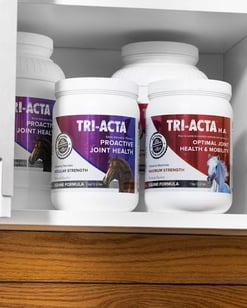
We are tooting our own horn here. But it is because we believe our equine joint supplements for horses are that good. Consisting of 100% pure active ingredients and zero fillers, TRI-ACTA and TRI-ACTA H.A. pack great therapeutic value for equine joint health.
Use our extra strength formula for older horses and those recovering from injuries and surgery.
TRI-ACTA H.A. for Equine
Our maximum strength formula is perfect for horses that are ageing, experiencing arthritis and stiffness, are in training and competition, or under a heavy workload.
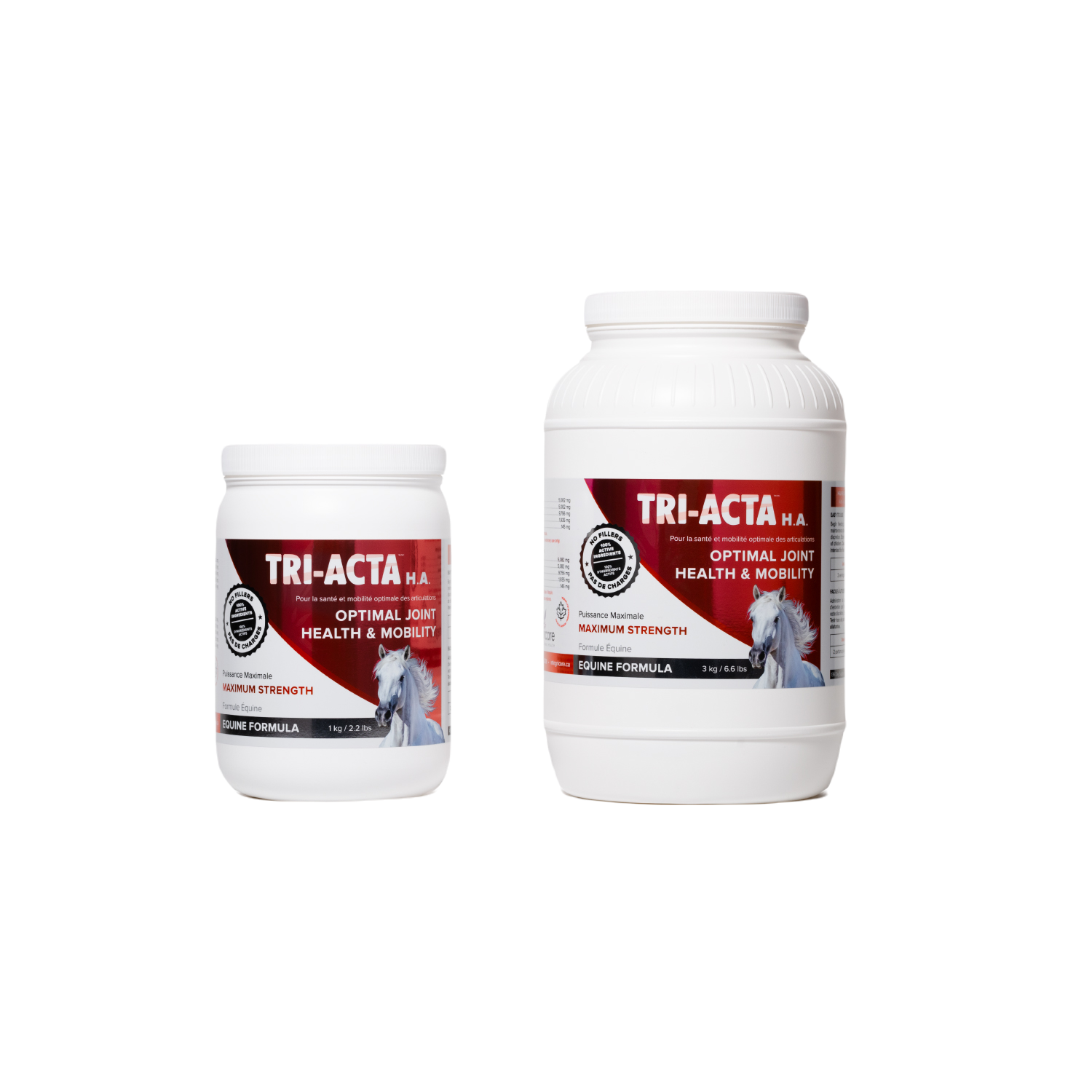
*Price starts at CAD $129.99 as of January 2023
Purica Recovery
Purica Recovery from Purica ticks our boxes regarding equine supplements. The label documents all ingredients. We like that the ingredients are pure and free from artificial fillers and allergens.
Though Purica Recovery is a good supplement, it is missing the all-important Chondroitin sulfate. Glucosamine is most effective when combined with Chondroitin sulfate to support joint health. Chondroitin sulfate supports the regeneration of cartilage as well as slows down cartilage degeneration in horses with conditions like arthritis.
*Price starts at CAD $87.97 as of January 2023.
MadBarn Optimum Probiotic
Mad Barn is a Canadian brand known for their signature packing and quality equine products. Their Optimum Probiotic gut supplement is a good product for promoting digestive health. It contains pure ingredients and a blend of five probiotics to help your equine absorb nutrients, balance intestinal PH, prevent colic and diarrhea, and improve digestion.
Positioned as a filler-free product, this Optimum Probiotic offers excellent value for its price point.
*Price starts at CAD $26.92 as of January 2023.
Platinum Performance®
Platinum Performance is designed for horses of all breeds, ages, and activity levels. This supplement is specially formulated to support performance and recovery for athletic equines.
Though Platinum Performance supplement is filler-free and packs many therapeutic ingredients, it incorporates sugarcane molasses. These can be problematic for horses with stomach ulcers and those susceptible to Laminitis due to the sugar content. In addition, the price point is significantly higher than other similar products in the market.
*Price starts at CAD $255.56 as of January 2023.
Mad Barn Biotin
Another Mad Barn product makes our list with this coat and hoof supplement. Mad Barn Biotin is filler-free and contains high-level concentrations of Biotin to promote a healthy and strong hoof structure.
The downside to the product is the presence of distiller grains which can harbor mycotoxins, especially if the grains are derived from corn.
*Price starts at CAD $60.51 as of January 2023.
Basic Equine Calminex
Basic Equine is another Canadian brand that manufactures equine nutrition and health supplements. This particular product, Calmex, is designed to keep horses calm and moderate behavior for high-performing horses or horses susceptible to anxiety and stress.
We like that it is filler-free and induced with live yeast cultures. Yeast cultures support digestion, reducing acidity, and overall supporting hindgut health.
*Price starts at CAD $63.50 as of January 2023.
Summary
Equines at all stages of life are susceptible to some nutritional deficiencies. And the best way to cater to these nutritional gaps is by using a high-quality health supplement.
Your ultimate goal as a horse owner, and ours, is a healthier, happier horse. So remember to supplement in measure, with the guidance of your veterinarian/nutritionist, of course. And give supplements following the manufacturers’ instructions. In addition, keep your horse active and well-exercised.
Check out our blog for information about other equine resources and more about our products.
TRI-ACTA for Equine
Providing preventative support for younger horses and helping mitigate the early onset of joint degeneration and other mobility issues.
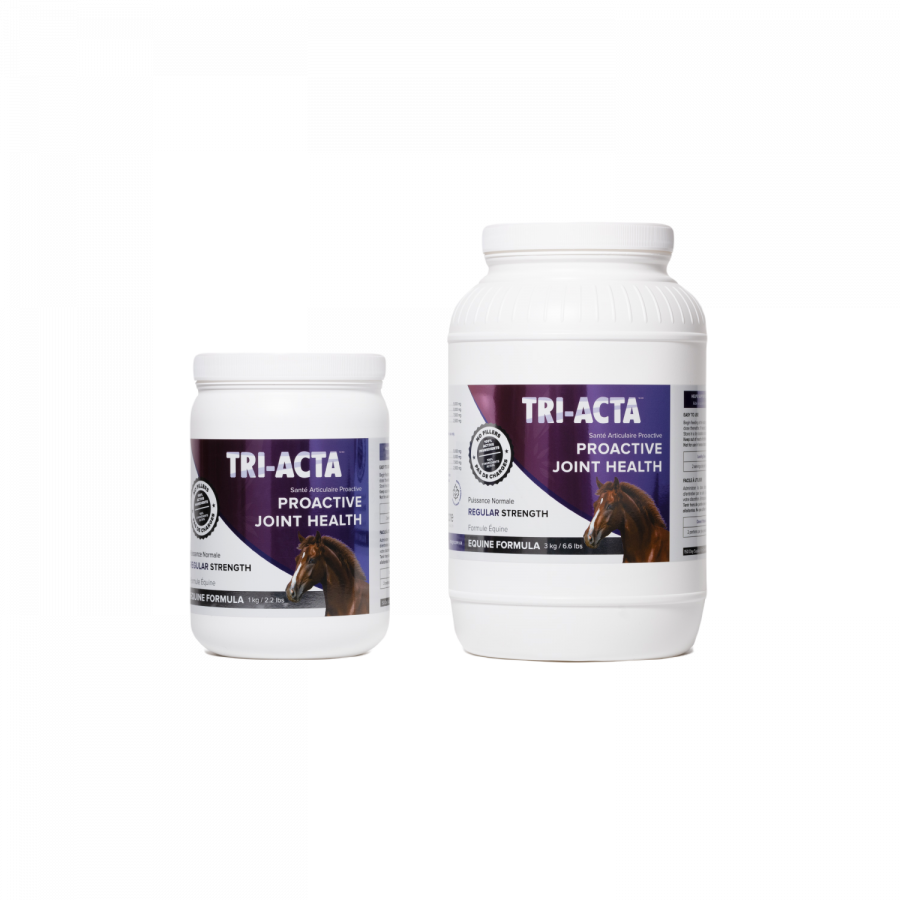
Newsletter Signup
Subscribe to our newsletter to receive the latest news and exclusive offers.
.jpg?height=2000&name=Cliick_Integricare-DISPLAY-REVISEDV2%20(1).jpg)
Proactive & Therapeutic Joint Supplements
When given daily, Integricare joint supplements recover bone and joint injuries faster and help prevent mobility injuries from happening in the first place.


